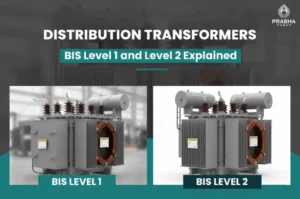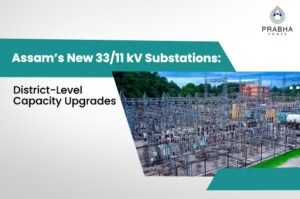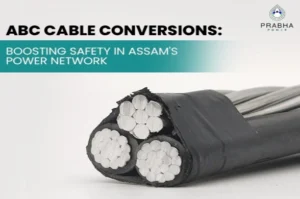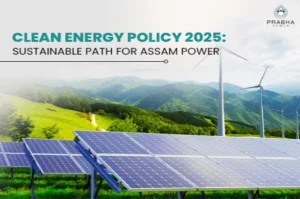
Assam’s Clean Energy Policy 2025 is in the news more often as that region looks to provide cleaner and more sustainable energy for the future. Rising energy demands, environmental pressures, and pressure from national directives for renewables mean that Assam is looking to shift the balance from a reliance on fossil fuels to having abundant clean energy sources. Whether you are a household in the community or a business owner, the policies that are being developed now will impact your future energy bills, job market, and environment for many decades.
Assam’s Integrated Clean Energy Policy 2025 is meant to fast-track the state’s renewable energy trajectory. The policy provides specific targets, with a total ambition of installing 11,700 MW of renewable energy capacity, including achieving an additional 2,000 MW of solar dynamic capacity by 2025 and 3,500 MW of solar dynamic capacity by 2030.
In this blog, we will cover the major clean energy initiatives in Assam, developments in the renewable energy policy framework, power sector reforms, and the clean energy opportunities and challenges associated with solar, wind and nascent technologies. We will highlight advancements and challenges that drive renewed optimism for the transition within the power sector in Assam, as well as how Prabha Power is preparing to address these exciting opportunities.
Getting to Know the Assam Clean Energy Policy 2025
Why does Assam need a clean energy policy now?
As Assam’s economy grows, its energy demand will also grow. Unfortunately, the state has historically relied extensively on coal and gas. India has introduced a requirement for new industrial and commercial projects to procure at least 50% of their energy needs from clean sources, ensuring sustainable expansion and providing the huge energy users a clear path to renewables from day one.
The policy also focuses on attracting investment from public or private sectors, recognising that funding is a critical part of bringing any plans to fruition.
- That is both economically and environmentally unsustainable. A cleaner, greener policy has many upsides:
- Affordable, local energy from wind or solar will reduce the dependence on imported, costly fuels.
- Reduced carbon emissions principally as Assam contributes to India’s climate objectives.
- Rural empowerment, where off-grid renewables are one way to achieve rural electrification.
What Is New For 2025
The Assam clean energy policy of 2025 provides new incentives and reforms. Here are the key highlights:
- A subsidy and soft loan investment in rooftop solar and small wind projects.
- Increased process simplification and single-window clearance for renewable energy developers.
- Net-metering frameworks allow homes to onsite surplus solar power back to the grid.
- Hybrid support models with solar and wind, and batteries.
- Advancing to make Assam a manufacturing hub for renewable energy, with solar modules and wind turbine components.
Clean Energy Initiatives in Assam You Should Know About
1. Solar rooftops and farms
- A large portion of the policy is centered on solar:
- Homeowners and businesses can apply for grants to install rooftop systems.
- Large-scale solar farms are being supported with attractive tariffs and land-lease incentives.
- There are pilots of micro-grid projects in remote tea estates and villages.
2. Wind energy potential
- While wind is not common in Assam, some regions near the hills can be captured:
- Feasibility studies are underway. Hybrid solar-wind schemes (with battery storage) can be seen being tested in some remote regions.
- The goal is to provide constant power in areas where it is not practical or cost-effective to extend the grid.
3. Small Hydropower and Biomass
- The policy is not just about the sun and wind, and:
- Small hydo (< 25 MW) installations can use the simplified processes associated with particular approvals.
- Biomass (agricultural wastes, e.g., rice husks) plants are being promoted – using waste to create power.
- This enables rural communities, including farmers, to not only reduce wastes from agriculture but also create additional income.
4. Energy efficiency and grid reform
- Clean energy isn’t just about generation – it’s also about using energy wisely:
- The policy has values for appliances, LED light bulbs, and energy audits.
- There is a plan for grid modernisation with smart meters and reductions in technical losses.
- These steps will cut costs for consumers and create a smoother process for renewable integration.
Key Changes in Assam Renewable Energy Policy
The Assam Renewable Energy Policy 2025 establishes a broad framework to expedite the transition to zero-carbon energy within the state. Financial incentives include subsidies and soft loans to minimize upfront costs, designed to encourage broader participation from households and businesses. It includes references to net-metering that would allow users to sell their excess solar power back to the grid, further enhancing rooftop systems.
The new policy, developed in line with Assam’s Renewable Energy Development Policy, uses a single-window clearance system to simplify project approvals; it supports hybrid energy systems that include combinations of solar energy, wind energy, and battery storage to provide run-time; shows support for using small hydro, and emphasizes the use of biomass resources that use local rivers and farm waste.
The policy will also support smart meters, upgrading infrastructure, and grid modifications to support more energy efficient and reliable systems to appeal to producers and further position Assam as a forward-looking transparent policy-oriented state in India’s renewable energy ecosystem.
Assam Power Sector Reforms: What’s Changing?
As part of its power sector reforms, Assam is working to build a better energy ecosystem that is both efficient and made for renewable energy. As a part of these reforms, Assam would like to focus on improving the financial viability of power utilities by making billing easier, improving methods of reducing transmission and distribution losses, and ensuring that tariffs are charged on time. In addition to this, the state would like to focus on modernizing the grid (smart meters, advanced metering, etc.) to enhance visibility and reliability.
While all of this is happening, Assam is also working on regulatory reforms to improve competitiveness, attract investors, and increase the opportunities for private sector participation and good business.
All of these reforms are especially important to provide accommodation for renewable energy sources, to provide 24/7 reliable power supply to the people of Assam, and to keep up with and sustainably manage energy demand in Assam.
- Discom Reform: Distribution companies are being driven toward greater efficiency, better billing systems and more transparency.
- Private Sector Welcome: The government is inviting private entities (such as Prabha Power!) to invest in generation, distribution and service delivery.
- Incentive-aligned contracts: Performance-based contracts give rewards for delivered clean energy and reliability.
- Market Openness: Plans are underway for open access, allowing large consumers to buy power directly from renewable producers.
These changes hope to make the Assam power sector more competitive, equitable and clean.
Solar and Wind Policy: Details You Will Need to Know
Solar policy details
- Residential rooftop systems up to 10 kW have rebate arrangements.
- Commercial rooftop and land-based utility solar projects have locked in higher tariffs for up to 25 years.
- Net–metering with annual settlement, alleviating cash-flow pressures.
Wind policy specifics
- Identified wind-potential zones (especially southern and eastern).
- Feasibility studies are supported through state government funding.
- Hybrid tenders with wind, solar and batteries are underway to provide 24-hour power.
These targeted arrangements assist in ensuring that solar and wind projects can be scalable and viable.
Challenges Ahead & What Is Being Done
Good policy must have good implementation, and here are the challenges and how Assam is meeting them:
Funding challenges
- Challenge: High up-front costs of projects discourage small and rural adopters.
- Response: State banks and NABARD offer special clean energy loan windows at very low interest.
Grid stability
- Challenge: Supply from renewable sources can be inconsistent.
- Response: Investment in battery technology, pumped storage and smart-grid technologies is expanding rapidly.
Ignorance and distrust
- Challenge: To date, many people simply do not understand or trust that solar or hybrid systems will work for them.
- Response: Demonstration projects in schools, tea estates and local fairs are demonstrating solar energy and hybrid energy systems for real benefits, and positively influencing users about the possibilities of clean energy.
Maintenance and support
- Challenge: Many remote projects fail because of a lack of maintenance.
- Response: The local training initiatives and the potential for practical retraining of maintenance operators provide assurance to long-term operation and sustainability.
These are essential initiatives to convert policy into clean energy benefits.
Why Prabha Power Is Ready to Lead
Prabha Power isn’t just observing the clean-energy transition; it’s ready to play a role. Here’s how:
- We’re installing rooftop solar systems for homes and businesses.
- We’re searching for hybrid solutions to fit solar and storage together – ideal for the terrain in Assam.
- We’re making the process easier by assisting customers with the paperwork, net-metering applications and financing.
- What’s more, especially in the countryside, our push for maintenance services and training will enable renewable energy to propagate, not merely deploy.
Conclusion
The Clean Energy Policy 2025 of Assam is blazing a path to a brighter, greener future, and Prabha Power is ready to help you participate. If you are considering rooftop solar or looking for trustworthy transformer solutions, we bring a commitment to innovation, quality and technological acumen.
Our wide range of distribution and power transformers and custom-built solutions means you’ll get the right solution every time, so you don’t have to buy twice. Are you ready to transition to smarter, cleaner energy? Get in touch with Prabha Power at 093948 79486 to help power a Sustainable Tomorrow – Together.






